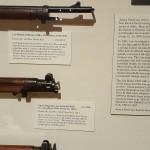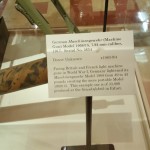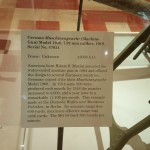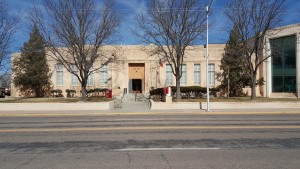 Last weekend, my son had an academic competition in Canyon, Texas. The competition was held on the campus of West Texas A&M University. I went along to cheer him and his team on, and while I was there I took advantange of some time when the kids weren’t competing to slip over to the Panhandle Plains Historical Museum, which is on the campus. It’s the largest historical musueum in the state, with museum being defined as a facility which houses indoor exhibits. And places like the National Ranching Heritage Center, which has a number of reconstructed buildings, don’t fall under this definition.
Last weekend, my son had an academic competition in Canyon, Texas. The competition was held on the campus of West Texas A&M University. I went along to cheer him and his team on, and while I was there I took advantange of some time when the kids weren’t competing to slip over to the Panhandle Plains Historical Museum, which is on the campus. It’s the largest historical musueum in the state, with museum being defined as a facility which houses indoor exhibits. And places like the National Ranching Heritage Center, which has a number of reconstructed buildings, don’t fall under this definition.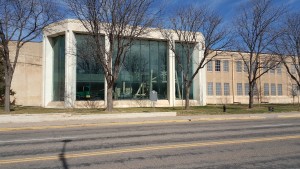
I didn’t have time to see everything. There are two floors, plus a basement. There are fossils, old cars, windmills, a frontier town, pottery, swords, natural history displays, and that’s just the basement and the ground floor. I had just gotten to the second floor and was looking at the firearm display when the teacher accompanying the students texted me to say they were leaving. So, I’m going to show you some of the things I saw in several installments. Click the photos for a larger view.
This post is going to focus on what I saw of the firearm exhibit, which won’t be everything. I snapped this group of pictures in a hurry since we were leaving, and some of them didn’t turn out quite as clear as I thought once I looked at them carefully. I intend to go back and take my time walking through the museum at some future date and get a better set of pictures.
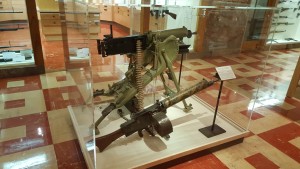 On the left is a pair of German machine guns from WWI. They are water cooled. There was a docent in the firearms exhibit. He told me that originally the guns had water tanks to hold the cooling water. As far as he knew, there were no more in existence; the museum had been attempting to find some. The guns were in excellent condition for their age. I don’t know if they are still in firable condition. I took pictures of the informational cards and will post them at the end of this post for anyone who is interested.
On the left is a pair of German machine guns from WWI. They are water cooled. There was a docent in the firearms exhibit. He told me that originally the guns had water tanks to hold the cooling water. As far as he knew, there were no more in existence; the museum had been attempting to find some. The guns were in excellent condition for their age. I don’t know if they are still in firable condition. I took pictures of the informational cards and will post them at the end of this post for anyone who is interested.
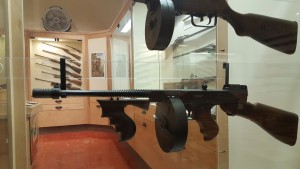 This is one of my favorite weapons, a Thompson submachine gun. They are unfortunately illegal for private citizens to own. That doesn’t stop me from wanting one. Yes, I’ve watched too many Depression-era ganster movies.
This is one of my favorite weapons, a Thompson submachine gun. They are unfortunately illegal for private citizens to own. That doesn’t stop me from wanting one. Yes, I’ve watched too many Depression-era ganster movies.
There was one display in the firearms exhibit that I found especially interesting. That was the British Enfield Rifles. I took several photos of this one.
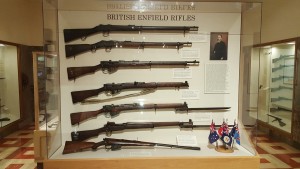 In 1861, James Paris Lee invented a spring-loaded column feed system for cartridge firing rifles. It was first used on the Springfield 1861 Rifled Musket. In 1879, Lee added a bolt action in addition to the spring-loaded column-feed magazines. This design soon became the standard for military weapons world wide. In 1888, the British Army adopted the Lee-Metford rifle, which became the Lee-Enfield (a shortened version). The Enfield rifles were standard British issue from 1895 to 1957.
In 1861, James Paris Lee invented a spring-loaded column feed system for cartridge firing rifles. It was first used on the Springfield 1861 Rifled Musket. In 1879, Lee added a bolt action in addition to the spring-loaded column-feed magazines. This design soon became the standard for military weapons world wide. In 1888, the British Army adopted the Lee-Metford rifle, which became the Lee-Enfield (a shortened version). The Enfield rifles were standard British issue from 1895 to 1957.
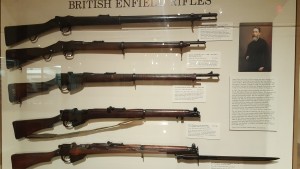 Here are slightly closer views of the rifles and their evolution. Click to enlarge. I’ll include a shot of some of the informational cards at the end of the post. The cards contain information about the rifle, such as the serial number of that particular weapon and the years it was used, along with the name of the donor (if known).
Here are slightly closer views of the rifles and their evolution. Click to enlarge. I’ll include a shot of some of the informational cards at the end of the post. The cards contain information about the rifle, such as the serial number of that particular weapon and the years it was used, along with the name of the donor (if known). 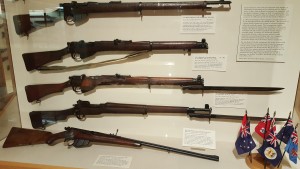
The last display I want to show is a selection of firearms from World War I. This particular display has both rifles and hand guns. It was one that I thought I had more pictures of, and I almost didn’t include it because I didn’t get good shots of the cards. But then I figured some of you might like to see it anyway.
There were more displays that I didn’t get a chance to look at, such as the WWII weapons. This was an impressive exhibit. The docent told me they have around 200-250 guns that aren’t on display (if I’m remembering that number correctly).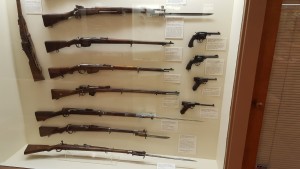
That’s about all of the things I’m going to say about the firearms. The rest of the photos are details of the information in the displays.
If you’re ever in the Panhandle, try to stop by and visit the museum. Canyon is about half an hour south of Amarillo and an hour and a half north of Lubbock. I had known of the museum for some time, but I hadn’t realized just how much was there. As I said, I’ll be going back.

